Food Dogs Can Eat and Can’t Eat
When you adopt a dog, the question you should ask yourself is, are you ready to take responsibility for this creature, which has an average lifespan of 10-15 years and lives depending on humans?
When choosing the dog that will fit into your life, remember that beautiful hybrid dogs are waiting to be adopted in shelters and on the streets to have a family.
Contrary to popular belief, it is not necessary for the dog to have been taken from a shelter as a puppy in order to communicate with you, get used to you and love you.
Adopted young or adult dogs adapt to their new owners and homes much more quickly and easily.
In addition, baby dog care and training is a more difficult choice that requires much more patience.
Dogs like to go outside, walk, exercise and socialize just like us.
For all these reasons, it would be the right step to take them for a walk at least 3 times a day and aim to spend more quality time than the duration of the tour.
So how should we feed the dogs that help us so much in our daily lives?
What Will We Learn?
Can Dogs Eat Bananas?
Yes. You can give your dog a moderate amount of banana.
Banana, which can be considered as a healthy and low-calorie gift for dogs if given in moderation, contains potassium, fiber, copper and various vitamins.
Since this fruit has a high sugar content, it is useful to give it to your dog carefully.
Yes, we said that bananas are beneficial for dogs, but it should be noted that even if some dogs are in the beneficial category, there may be foods that they do not like or are allergic to.
The best person to help you in this regard is your veterinarian.
If your veterinarian does not see a problem with your dog eating a banana, you can peel the banana and share the banana with your dog.
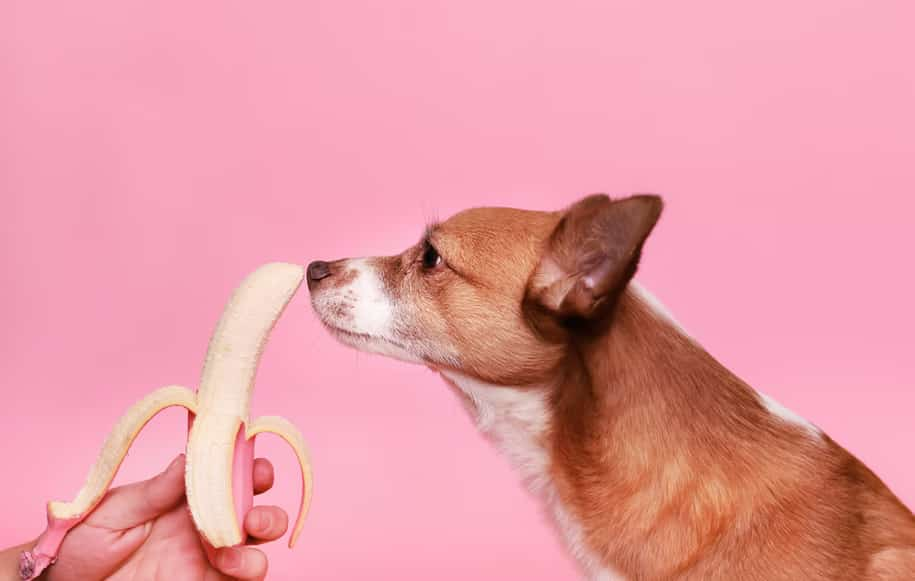
Banana peel can cause constipation and serious digestive problems.
Banana is a fruit that should not be consumed too much, and its benefits turn into harm when consumed.
Consuming large amounts of bananas can cause constipation in dogs.
Banana peel is known to be beneficial for human skin, but it would not be correct to say this for dogs.
When a banana with a peel is consumed, dogs may experience indigestion as well as constipation.
If you are going to make any changes or innovations in your dog’s diet, you should first talk to your veterinarian.
If you are sure that your dog is not allergic to bananas, and if your veterinarian approves, observe the changes in the gastrointestinal tract after your dog eats bananas.
Your dog may not be allergic, but bananas may bother him.
Whatever you do, be careful not to give the foods we recommend as useful snacks in much greater amounts than they are, even if your veterinarian approves.
Can Dogs Eat Apples?
Yes. You can give your dog a moderate amount of apples.
Apples are very rich in vitamins A and C, and are a useful fiber source for dogs.
It is also very low in fat and protein, making it a healthy snack for your older dogs.
Be sure to remove the cores before giving apples to your dog.
You can give half an apple to your dog by talking to your veterinarian.

Since the core of the apple contains arsenic, you should not give it to your dog.
Apples also contain antioxidants, which will do wonders for your dog’s diet.
Can Dogs Eat Blueberries?
Yes. You can give your dog a reasonable amount of blueberries.
Blueberries, which are recommended in the diets of dogs, are rich in antioxidants, selenium, zinc and iron, as well as contain vitamins C, E, A and B. For a healthy diet, 2-3 blueberries are useful foods as a reward for dogs.
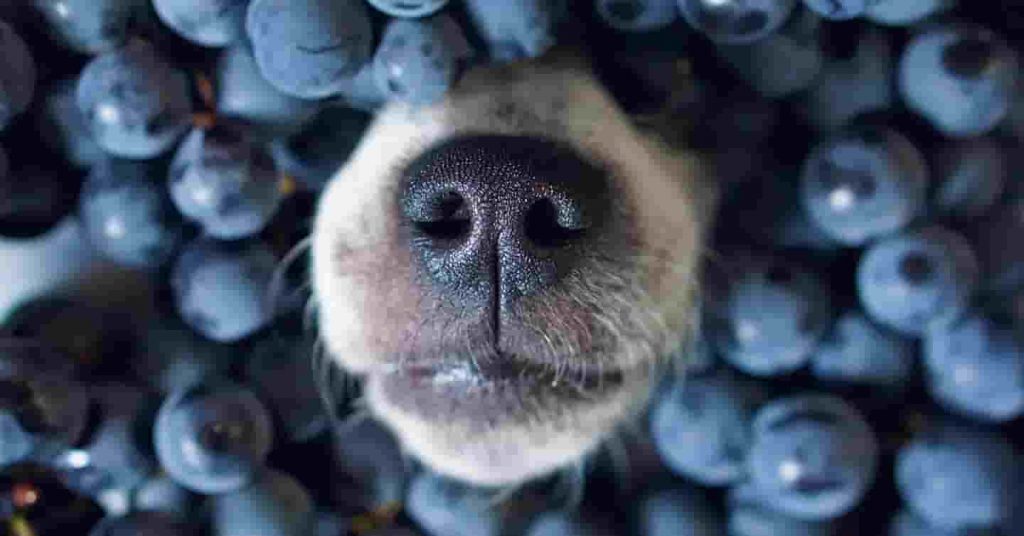
Can Dogs Eat Strawberries?
Yes. You can give your dog a reasonable amount of strawberries.
Strawberries contain fiber and Omega-3, which are good for digestion for both humans and dogs.
It is also a good source of vitamins C, B1, B6 and K, as well as potassium, iodine, magnesium and folic acid.
This is a fruit that will not only be delicious, but will also strengthen your dog’s health.
Although consuming too much of something (human or animal) may seem like a good thing, it is actually not a good thing.
Strawberries contain sugar that some dogs have a hard time dealing with.
Any dog that eats too many strawberries may experience stomach upset and suffer from certain gastrointestinal conditions.
It’s always best not to overdo it, and you should always ask your vet about the appropriate portions for your dog.
If you have a strawberry garden, carefully monitor your dog’s access to it and make sure he doesn’t eat too much.
If you use pesticides or herbicides, never let your dog eat those berries.
If your vet has approved giving strawberries to your dog, be sure to give them fresh, organic strawberries that have not been treated with pesticides, preservatives or herbicides.
Also, wash your strawberries thoroughly before feeding them to your dog.
Strawberries are quite soft and small so there is little to no risk of choking, but for small dogs you can give them a little help by chopping or crushing strawberries.
You can mix them privately into dog food, use them as rewards during training, or freeze them for a refreshing summer snack.
While fruit is healthy for many people, it’s best to ask your vet before sharing any food you eat with your dog.
Can Dogs Eat Grapes?
No. You should never, ever give grapes to your dog.
A substance in grapes causes poisoning in dogs.
Studies have not found what causes it.
If your dog eats too many grapes without you realizing it, this can have dire consequences.
However, not all dogs show the same symptoms or the same course of illness after eating grapes.
There have been reports of dogs regularly eating kilos of grapes and showing no symptoms.
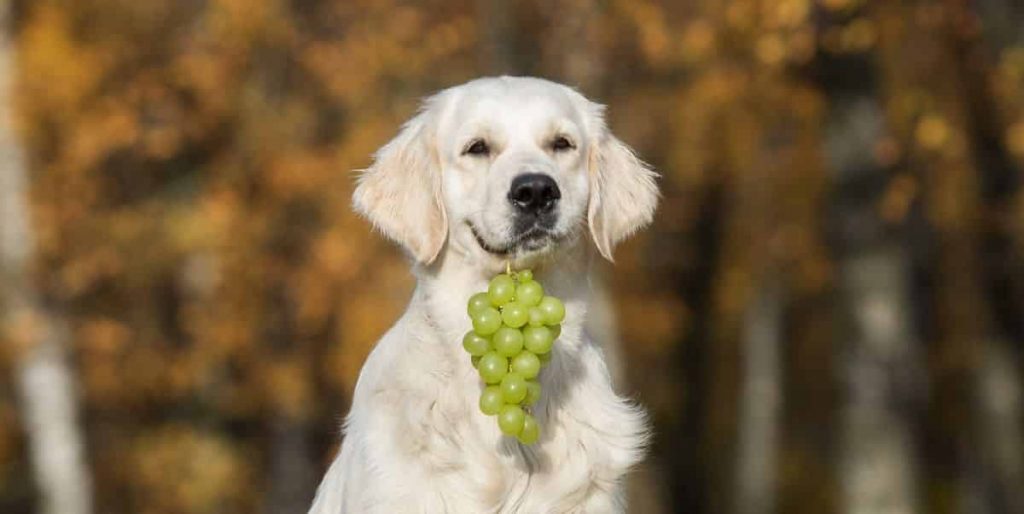
However, some dogs suffered from kidney failure and died after eating grapes.
Scientists have yet to answer why the dogs’ response is so different.
Grapes are generally non-toxic to dogs.
Factors such as the amount of grapes consumed and individual predisposition play an important role.
The researchers hypothesize that susceptibility varies greatly within the dog population and that poisoning is dependent on the dog’s individual propensity.
Studies have shown that 50% of dogs die from grape poisoning.
Therefore, it is better not to challenge the sensitivity of your four-legged friend and refrain from feeding it with grapes.
Grape poisoning can occur even at low doses.
10 g of grapes per kg/body weight (body weight) may be enough for your four-legged friend to develop severe symptoms.
However, not only grapes are harmful to our dogs, grape pulp and raisins can also cause poisoning.
2.8 g per kg/body weight is enough for raisins to cause symptoms of the disease.
Therefore, you should also make sure that your four-legged friend does not eat muesli bars, pieces of cake or other foods with raisins.
According to the Animal Poison Control Center in the United States, some of the dogs that ate grapes experienced the following symptoms:
- Increased urea nitrogen levels in the blood
- Increased serum creatinine levels
- To vomit
- lethargy
- Eating disorders/reluctance to eat
- Diarrhea
- Decreased urine output
- Movement coordination disorders
- Increase in the level of calcium and phosphate in the blood
- Kidney failure leading to death
If your dog has eaten grapes without your knowledge, report it to your veterinarian immediately.
Can Dogs Eat Broccoli?
Yes. You can give your dog a reasonable amount of broccoli.
It is rich in vitamins A, C, E and carotene.
It helps prevent cancer. So broccoli will be a good snack for your dog.
When broccoli is boiled, it releases cancer-fighting enzymes.
Broccoli contains 33 different anti-cancer structures.
In addition, some of the structures it contains contain phytochemicals that prevent the formation of carcinogenic cells and attack unhealthy cells.
It strengthens the body’s defense system.
The vitamins it contains strengthen the hair follicles and prevent hair loss.
Broccoli also contains plenty of fiber. In this way, it plays an active role in weakening your dogs by causing a feeling of satiety.
Broccoli helps to prevent possible heart problems by balancing blood pressure.
Can Dogs Eat Pineapple?
Yes. Dogs can eat pineapple with moderate amounts.
Pineapple is rich in fiber. It contains calcium, magnesium, vitamins A and C, as well as vitamins and minerals, including folic acid.
There is no harm in giving a small amount of pineapple to your dog.
Just like us, they can’t eat the kernel because it’s too hard for them to digest and it risks getting stuck in their system.
It’s a good idea to give pineapple to your dogs during the warmer times of the year, because pineapple is made up of water.
Since pineapple has antioxidant properties, it can speed up the healing process of your dog’s injury.
If you are considering giving pineapple to your dog, make sure you choose the right amount of pineapple for your dog’s weight and height.
Make sure you give less pineapple to underweight dogs.
If you have a puppy, you should not give him pineapple without first talking to the vet.
Can Dogs Eat Sour Cream?
Yeah. You can give your dog a small amount of sour cream.
Sour cream is a nutritious food for most dogs.
Sour cream is not recommended by veterinarians if your dog is lactose intolerant or overweight.
Since sour cream has a high-fat content, you should not give this food too much to your dog.
Also, giving your dog onion chips isn’t going to be good for him.
If your dog eats onions or any onion product, their red blood cells may be damaged, resulting in anemia.
Why Do Dogs Eat Grass?
Dogs try to compensate for the deficit caused by the parasites’ exploitation of vitamins and minerals in the organism by eating grass.
Dogs aim to relieve their digestive systems, which are disturbed by the toxins caused by parasites, by eating grass.
Dogs can also engage in grass-eating behavior when they have intestinal parasites.
In addition, it has been determined that dogs who are deficient in exercise, become apathetic and under stress can show grass-eating behavior.
Whatever the reason, dogs eating grass shouldn’t bother pet owners.
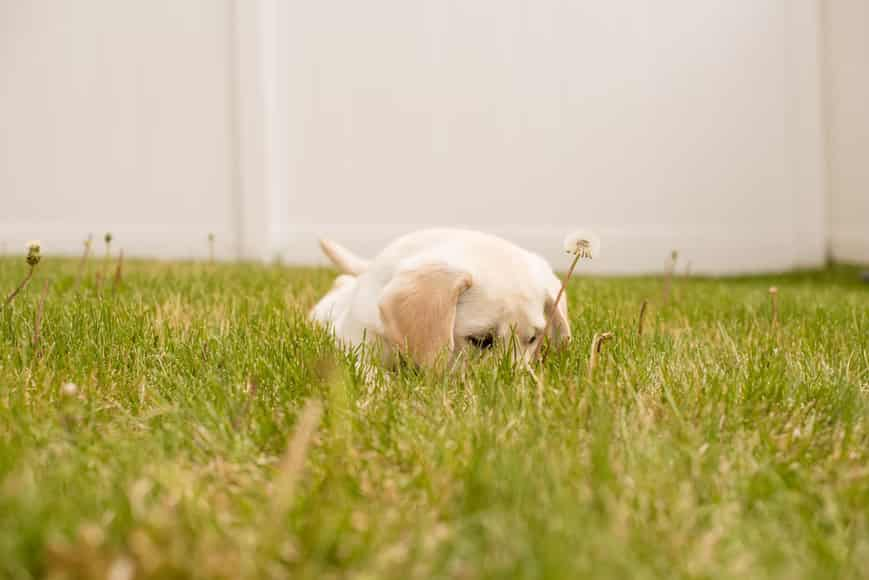
There is no harm in eating grass for dogs with regular parasite control. It should be remembered that dogs do not shape any behavior without reason.
Can Dogs Eat Oranges?
Yes. You can give your dog a reasonable amount of oranges.
You should not give more than a quarter of an orange, which contains fiber, potassium, calcium, folic acid, iron, vitamins A, C, B1, and B6.
In addition, the kernels must be extracted. Apart from that, any citrus product is harmful to dogs.
Orange, which strengthens our immunity, especially in winter, shows the same effect in dogs.
In other words, it strengthens the immune system of dogs and helps to remove toxins from the body.
In some dogs, excessive diet and excessive exercise may impair the liver’s capacity to make vitamin C and may need to be given with beneficial foods with the approval of veterinarians.

But Orange has lots of sugar and calories.
Therefore, especially diabetic dogs may need to avoid oranges.
You should not give any food, even beneficial, to your pet without the approval of your veterinarian.
Foods may not have the same effect in every animal.
Just as apples are bad for some of us, pineapple can be bad for other people.
This is also the case with animals.
Can Dogs Eat Avocado?
No. You should never give avocado to your dog.
The part of avocado that can be harmful to your dog is not the fleshy fruit, but the seeds, peel and leaves.
These parts of the fruit contain a substance called persin that can cause your dog to vomit and have diarrhea.
Persin is a fat-soluble toxin that is dangerous to non-human mammals.
Experts state that pets sensitive to persin may experience “respiratory distress, congestion, fluid buildup around the heart.” Source
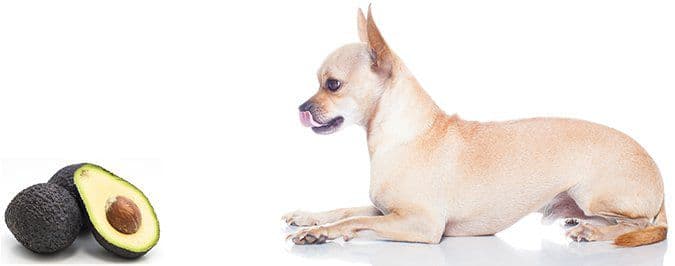
Stay away from avocado in snack recipes you prepare at home for your dog.
You can use pumpkin puree instead of avocado.
Can Dogs Eat Eggs?
Yes. Eggs are good for your dogs.
Dogs can eat eggs, either boiled or raw, depending on their preference, usually once a week or once every 15 days.
Chicken eggs are very strong in terms of nutrients and contain Vitamins A and B12, Iron, Folate, Selenium and fatty acids.

The second point to be raised about egg consumption in dogs is the Salmonella bacteria found in raw eggs.
At this stage, there are two views that animal lovers consider:
- First Opinion: Salmonella bacteria will harm our dog’s digestive system if raw eggs are given to dogs.
- Second Opinion: The digestive systems of dogs are suitable for raw feeding and they can easily digest this type of bacteria.
Although there are some concerns about Salmonella bacteria, there are observations and opinions accepted by veterinarians.
It is believed that dogs can digest these bacteria contained in raw eggs.
Make sure that the eggs are not artificial eggs prepared in factories, but organic home eggs.
Another point to be considered if the egg is included in our dog’s feeding process is the possible biotin absorption problem.
Avidin in the egg white is an inhibitor of biotin, and when our dog consumes eggs, some problems may occur in the skin and digestive system due to the decrease in the amount of biotin in the body.
Of course, for such an effect, our dog must have taken a large amount of avidin, that is, he must have consumed a large number of eggs.
Therefore, it is possible to return to the previous paragraphs once again and point out that we should strictly follow the veterinary examination and recommendations regarding the period of time we can give the egg to our dog.
The last parenthesis to be opened regarding the consumşption of eggs by dogs is the shells of the eggs.
Egg shells are mineral-rich food groups and can be considered as an alternative food, especially in dogs that do not consume bone.
Observations made are that some of the dogs do not eat the shells and separate them from the eggs.
If our dog does not want to eat the egg shells, we can crush the shell into small pieces that our dog will not notice, and mix it with the egg and give it to our friend.
When we look at all this, we can clearly say that we can feed our dogs eggs, but as with all additional nutrients, we should act sensitively and follow veterinary recommendations.
Can Dogs Eat Cheese?
Yes. You can feed your dog cheese.
It is okay to give your dog small pieces of cheese.
In rare cases, some dogs may be averse and sensitive to dairy products.
If your dog has diarrhea or gets sick after eating foods containing dairy products, they should of course be avoided.
Most cheeses are fatty. If your dog is overweight or obese, fatty cheese will not be the right choice for him.
If your dog has a history of diseases such as pancreatitis, he will need to avoid foods containing high fat, especially.
Indispensable for breakfast, cheese, especially cheese (like old cheddar) which is rich in salt, can cause sodium poisoning in dogs.
Most dogs drink lots of water to dilute the salt they consume, but sometimes things get out of hand.
Things can change if you don’t balance the amount of salty cheese your dog eats.

Extremely salty foods can cause not only sodium poisoning in dogs, but also kidney problems.
If you suspect that your dog has consumed too much salty cheese and you have observed symptoms such as excessive thirst, weakness, vomiting, diarrhea and loss of appetite, which are among other signs of illness, you should contact your veterinarian without delay.
Soft cheeses (Cheddar, Mozzarella, etc.) are the type of cheese found more often in homes and these cheeses are also suitable for your dog.
As long as they do not contain additives other than being high in fat, there will be no harm in sharing them with your friend who does not have a weight problem.
Finally, we strongly recommend that you stay away from moldy cheeses (Roquefort and its derivatives).
Can Dogs Eat Onions?
No. Onions are toxic to your dog. Onions contain a chemical called N-propyl disulfide, which is seriously toxic to dogs.
This chemical targets the oxygen molecules in your dogs’ red blood cells, which causes oxidative damage.
The molecule also continues to attack foreign red blood cells in your dog’s body, known as hemolysis.
If left untreated, this can lead to anemia, with potentially fatal consequences.
Onions are not healthy for dogs and should not be eaten.
Onions are literally one of the most dangerous foods for dogs.
Onions are especially poisonous to puppies.
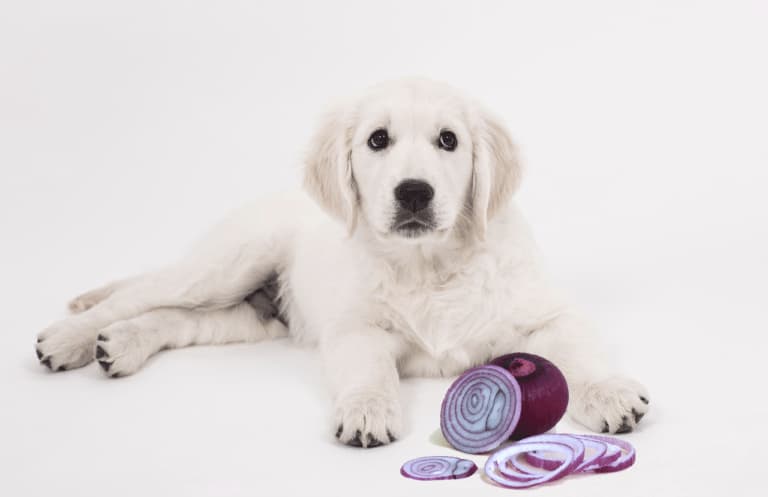
If your dog eats large onions, poisoning symptoms can appear quickly.
Your dog will show the following symptoms after onion poisoning:
- Withered gums
- Colorless or dark urine
- Vomiting
- Shortness of breath
- High heart rate
- Senseless movements
All types of onions, such as raw onions, cooked onions, dried onions, and fresh onion leaves, are harmful to dogs.
If your dog accidentally eats onions, be sure to consult your veterinarian, regardless of whether the onion is small or large.
Call your vet and if possible specify the size of the onion and when it was eaten.
Depending on your dog’s condition, you should go for gastric lavage as soon as possible.
Can Dogs Eat Cucumbers?
Yes. It is okay to give your dogs a reasonable amount of cucumber.
After washing the cucumber, which is rich in B1, C and K vitamins, you should peel the skins and cut them into sizes that your dog can swallow.
Make sure you cut the cucumber to a size that your dog can easily swallow.
Cucumbers are among the harmless vegetables for dogs, cats and horses alike.
It increases the energy level, especially in overweight or non-drinking dogs, and prevents the retention of fat because it contains a lot of water.
Cucumber is really useful food for dogs, but you should consult your veterinarian before giving it to your dog.
Some dogs may be allergic to certain foods, even if they are beneficial.
Veterinarians know this best.
Therefore, do not forget to get approval from your doctor before giving cucumber, which fights bacteria that causes bad odor in the mouth of dogs, to your dog.
It is okay to give your dog 1 or 2 small slices of cucumber a day.
Can Dogs Eat Carrots?
Yes. Dogs can eat a fair amount of carrots.
Carrots contain high fiber and beta-carotene, making them a healthy vegetable for dogs.
It is low in calories and contains vitamin A.
It is safe to add a small amount of carrots to your dog’s diet, but you should always discuss this with your veterinarian.
If your dog consumes this vegetable, it can help her get rid of dental plaque.
First of all, carrots are extremely rich in vitamin A, which can improve your pet’s vision and overall eye health.
In fact, not getting enough vitamin A can cause eye infections and even vision loss.
Vitamin A will help you strengthen your pet’s immune system and keep its skin clean.
Carrots are also a good source of vitamin K, which is necessary for blood clotting, and vitamin B6, which helps convert carbohydrates, fats and protein into energy.
Finally, the high fiber content of carrots also means they can help promote a healthy digestive system and regular bowel movements for your dog.
It is perfectly normal for many popular wet and dry dog foods to contain carrots.
While the number of carrots in your dog’s food won’t fully meet their total vitamin needs, it’s a common additive in many dog food formulas due to its nutritional benefits.
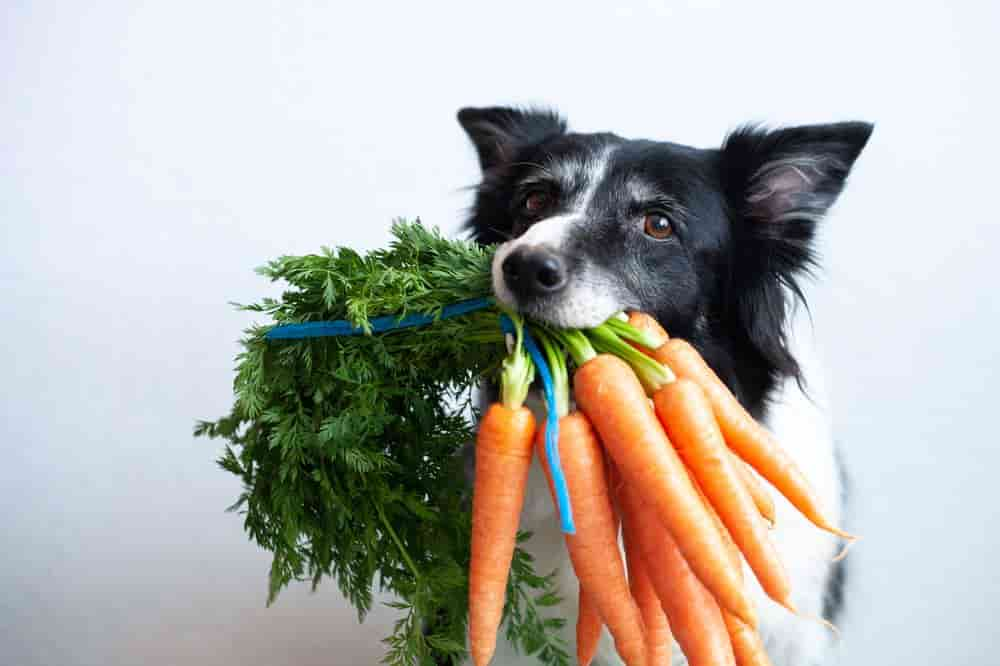
Even better, chewing raw carrots can also help improve your dog’s dental health.
Raw carrots can help dogs maintain their strong teeth due to the amount of chewing required to eat them.
These vegetables can also act as a brightener to keep your four-legged friend’s smile clean and healthy.
It’s always a good idea to cut whole carrots (including carrot sticks) into bite-sized pieces.
Carrots are especially dangerous for small dogs as they can pose a choking hazard if not cut properly.
To be on the safe side, be sure to watch your pet when snacking on a harder vegetable like carrots.
Carrots contain cells surrounded by cellulose that dogs cannot metabolize easily.
This is why pet parents might consider pureeing carrots in a blender to maximize their nutritional benefits.
This is why cooked carrots are ideal for dogs.
Steaming or blanching allows the cellular walls of the vegetable to break down and allow your dog’s vitamins and nutrients to be better absorbed.
When cooking and serving carrots, be sure not to add butter, salt, or any other additives that could be harmful and unhealthy for your pet.
Because such materials can irritate your pet’s stomach.
Can Dogs Eat Crackers?
Yes. You can give your dog a small amount of crackers.
Make sure the cracker contains salt and a small amount of water. It is not recommended to give your dog too many crackers, as they will not provide any benefit in terms of vitamins.
Dogs can eat small amounts of baby crackers.
This is because baby crackers contain less water and salt.
Don’t give your dog too many crackers, considering that the water and salt in baby crackers are low, because high calories and carbohydrates are not good for your dog.
You should avoid giving Pretzel Crackers to your dog due to the high sodium content.
Since poppy seeds are toxic to dogs, you should avoid giving poppy crackers to your dogs.
Each gram of poppy seeds contains 0.5 to 10 micrograms of Morphine (you can find the research at the link below).
Can Dogs Eat Tomatoes?
Yes. You can give your dog small amounts of tomatoes occasionally.
Tomatine is the toxic substance found in tomato plants and is related to solanine, the toxic substance in other nightshades.
It can be toxic to our beloved pets when consumed in large quantities.
Tomatine is higher in the green parts of the plant, especially the flowers and small stems, which may be good news.
The small amount of tomatine found in ripe tomatoes is considered safe for dogs.
Green tomatoes contain more tomatine, unripe tomatoes pose a danger to dogs.
Pet owners should be aware that the flowers, leaves, and stems of the tomato plant contain amounts of tomatine that are potentially dangerous to dogs.
However, it is unlikely that dogs will eat enough of the plant to cause problems.
Large grazing animals such as cattle are at highest risk for tomato plant poisoning.
The most common symptom of tomatine poisoning is gastrointestinal upset such as diarrhea or vomiting.
However, if dogs eat large amounts of the tomato plant, they may experience depression, muscle weakness, hypersalivation, dilated pupils or an abnormal heart rate.
In these cases, you should take your pet to the vet without waiting.
Just like in humans, tomatoes can worsen some gastrointestinal issues, such as acid reflux.
That’s why it’s always a good idea to consult your veterinarian before giving tomatoes to your dog.
Tomatoes are also a common allergen in humans, and although rare, your dog may have a similar reaction.
If your dog likes to chew on fresh tomatoes, remember that he may also be interested in a slice of pizza or spaghetti you’re eating.
Tomato sauces, ketchup, soups or juices are not particularly healthy for dogs because of the added salt and sugar, as well as artificial flavors or other chemicals they may contain.
However, small amounts of tomato-based products such as sauce probably won’t harm your dog.
When given to your pet in small quantities, tomatoes offer some benefits.
Tomatoes are packed with nutrients, including the carotenoids lycopene and beta-carotene, which are powerful antioxidants that can help prevent cellular damage.
The low-calorie fruit is also rich in fiber.
This aids digestion, and tomatoes are rich in vitamins A and C to help improve your pet’s vision and support healthier skin.
Although many people prefer their tomatoes salty, such additives can be harmful to your dog, so plain, well-washed small pieces of tomatoes are always the safest way to serve them to your pet.
Start with just one or two bites and see how your dog reacts.
If she likes tomatoes and doesn’t experience any side effects, feel free to keep giving small amounts as treats.
Can Dogs Eat Watermelon?
Yes. Dogs can eat a fair amount of watermelon.
Watermelon, which should be given after removing the seeds, contains low calories, vitamins A, B6, C, magnesium, water and potassium.
But be sure to give it sparingly as it is high in sugar.
The reason why the seeds are removed is because of the risk of creating a blockage in the intestines.
There are some points that pet owners should consider before sharing watermelon with their dogs: Watermelon seeds and rind. Watermelon seeds cause intestinal blockages in dogs, and the peel causes gastrointestinal disorders.
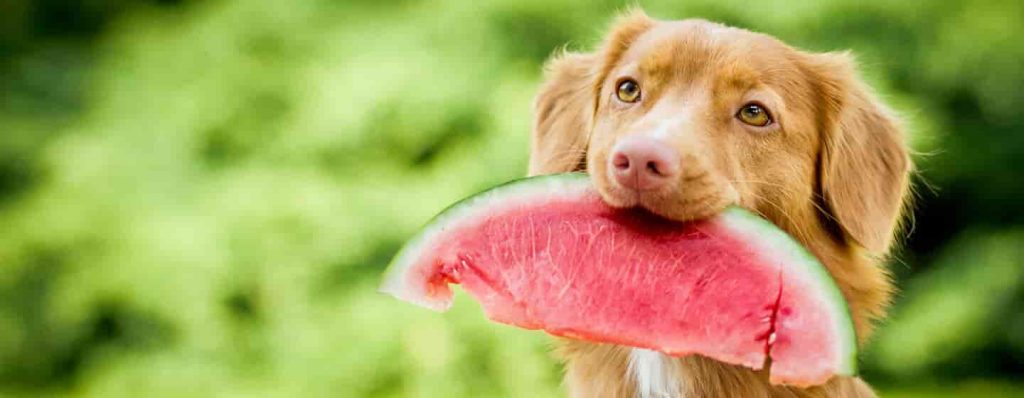
Apart from that, as long as you do not exaggerate the amount (maximum one thin slice), watermelon is not harmful to our canine friends.
We are sure that you will like our article.
If you have any questions please feel free to leave a comment.
All non-spam comments (whether good or bad) are approved.
Resources I use:
